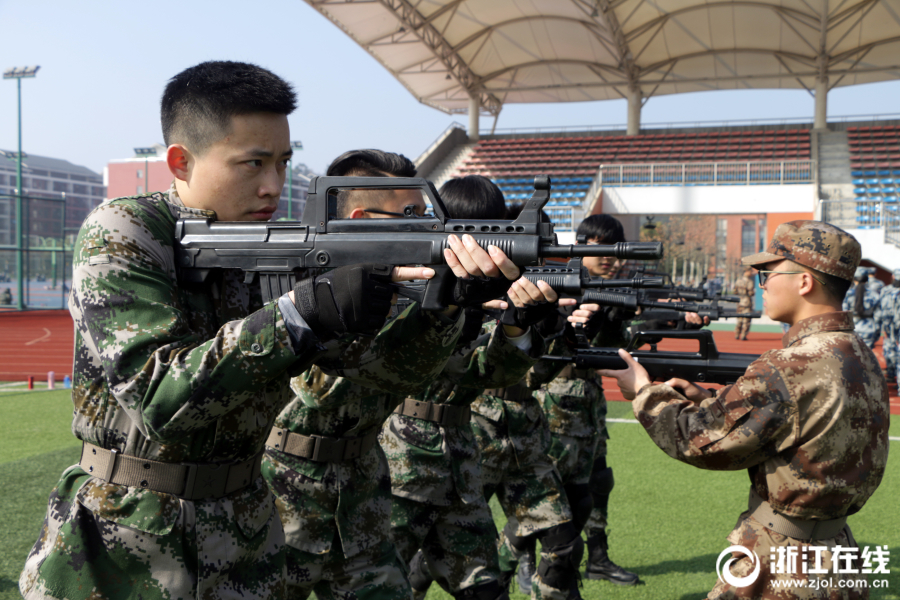
1. The five functions of the operating system are processor management, memory management, device management, file management and job management. Processor management The most basic function of processor management is to process interrupt events. After configuring the operating system, various events can be processed.
2. The main function of the computer operating system is process management, and its work is mainly process scheduling. In the case of a single user and a single taskNext, the processor is only monopolized by one user's task, and the process management work is very simple.
3. Operating System (abbreviation: OS) is a group of interrelated system software programs that supervise and control computer operation, use and run hardware, software resources and provide public services to organize user interaction.
4. Five major management functions of the operating system: (1) Job management: including tasks, interface management, human-computer interaction, graphical interface, voice control and virtual reality, etc. ( 2) File management: also known as information management. ( 3) Storage management: The essence is the management of storage "space", which mainly refers to the management of the main memory.
Any information system has five basic functions, namely: information collection and recording (input); information storage; information processing; information transmission; information output .
According to the functional introduction of the information system, the information system has five basic functions: input, storage, processing, output and control. Different functions have different functions, such as input function: the input function of the information system is determined by the purpose to be achieved by the system, the ability of the system and the permission of the information environment.
Five basic functions of the information system: input, storage, processing, output and control. Input function: The input function of the information system is determined by the purpose to be achieved by the system, the ability of the system and the permission of the information environment.Storage function: Storage function refers to the ability of the system to store various information and data. Mainly including: statistical functions.
The operating system has five functions: processor management: mainly controls and manages the work of the CPU. Storage management: mainly allocate and manage memory. Device management: mainly manage basic input and output devices. File management: responsible for the organization, storage, operation and protection of computer files.
The functions of the computer operating system include: processor management, memory management, device management, file management, job management and other functional modules. Processor management. The most basic function of processor management is to handle interrupt events. The processor can only detect interrupt events and generate interrupts and cannot process them.
The main function of the computer operating system is process management, and its main work is process scheduling. In the case of a single user and a single task, the processor is only monopolized by one user's task, and the work of process management is very simple.
The main functions of the operating system are process and processor management, job management, storage management, device management and file management, as follows: process and processor management. Because the execution of the program must rely on the processor, only one program flow can be processed and executed at any time. Homework management.
I) Processor management The most basic function of processor management is to handle interrupt events. The processor can only detect interrupt events and generate interrupts, and cannot handle these interrupt events. After configuring the operating system, all types of events can be handled.Another function of processor management is processor scheduling.
Five management functions of the operating system: job management: including tasks, interface management, human-computer interaction, graphical interface, voice control and virtual reality, etc. File management: also known as information management. Storage management: The essence is the management of storage "space", which mainly refers to the management of the main memory.

The storage management function of the operating system is to manage memory resources. It mainly realizes memory allocation and recovery, storage protection and memory expansion. The device management of the device management operating system is responsible for allocating and recycling external devices, and controlling external devices to operate according to the requirements of user programs.
The functions of the computer operating system include: processor management, memory management, device management, file management, job management and other functional modules. Processor management. The most basic function of processor management is to handle interrupt events. The processor can only detect interrupt events and generate interrupts and cannot process them.
The five functions of the operating system are processor management, memory management, device management, file management and job management.Processor management The most basic function of processor management is to process interrupt events. After configuring the operating system, various events can be processed.
Hearthstone Wild Decks-APP, download it now, new users will receive a novice gift pack.
1. The five functions of the operating system are processor management, memory management, device management, file management and job management. Processor management The most basic function of processor management is to process interrupt events. After configuring the operating system, various events can be processed.
2. The main function of the computer operating system is process management, and its work is mainly process scheduling. In the case of a single user and a single taskNext, the processor is only monopolized by one user's task, and the process management work is very simple.
3. Operating System (abbreviation: OS) is a group of interrelated system software programs that supervise and control computer operation, use and run hardware, software resources and provide public services to organize user interaction.
4. Five major management functions of the operating system: (1) Job management: including tasks, interface management, human-computer interaction, graphical interface, voice control and virtual reality, etc. ( 2) File management: also known as information management. ( 3) Storage management: The essence is the management of storage "space", which mainly refers to the management of the main memory.
Any information system has five basic functions, namely: information collection and recording (input); information storage; information processing; information transmission; information output .
According to the functional introduction of the information system, the information system has five basic functions: input, storage, processing, output and control. Different functions have different functions, such as input function: the input function of the information system is determined by the purpose to be achieved by the system, the ability of the system and the permission of the information environment.
Five basic functions of the information system: input, storage, processing, output and control. Input function: The input function of the information system is determined by the purpose to be achieved by the system, the ability of the system and the permission of the information environment.Storage function: Storage function refers to the ability of the system to store various information and data. Mainly including: statistical functions.
The operating system has five functions: processor management: mainly controls and manages the work of the CPU. Storage management: mainly allocate and manage memory. Device management: mainly manage basic input and output devices. File management: responsible for the organization, storage, operation and protection of computer files.
The functions of the computer operating system include: processor management, memory management, device management, file management, job management and other functional modules. Processor management. The most basic function of processor management is to handle interrupt events. The processor can only detect interrupt events and generate interrupts and cannot process them.
The main function of the computer operating system is process management, and its main work is process scheduling. In the case of a single user and a single task, the processor is only monopolized by one user's task, and the work of process management is very simple.
The main functions of the operating system are process and processor management, job management, storage management, device management and file management, as follows: process and processor management. Because the execution of the program must rely on the processor, only one program flow can be processed and executed at any time. Homework management.
I) Processor management The most basic function of processor management is to handle interrupt events. The processor can only detect interrupt events and generate interrupts, and cannot handle these interrupt events. After configuring the operating system, all types of events can be handled.Another function of processor management is processor scheduling.
Five management functions of the operating system: job management: including tasks, interface management, human-computer interaction, graphical interface, voice control and virtual reality, etc. File management: also known as information management. Storage management: The essence is the management of storage "space", which mainly refers to the management of the main memory.

The storage management function of the operating system is to manage memory resources. It mainly realizes memory allocation and recovery, storage protection and memory expansion. The device management of the device management operating system is responsible for allocating and recycling external devices, and controlling external devices to operate according to the requirements of user programs.
The functions of the computer operating system include: processor management, memory management, device management, file management, job management and other functional modules. Processor management. The most basic function of processor management is to handle interrupt events. The processor can only detect interrupt events and generate interrupts and cannot process them.
The five functions of the operating system are processor management, memory management, device management, file management and job management.Processor management The most basic function of processor management is to process interrupt events. After configuring the operating system, various events can be processed.
Free sports events uefa champions league app android
author: 2025-01-08 11:33bingo plus update today Philippines
author: 2025-01-08 11:18 TNT Sports
TNT Sports
177.31MB
Check UEFA TV
UEFA TV
784.66MB
Check LR stock price Philippines
LR stock price Philippines
177.46MB
Check Walletinvestor digi plus
Walletinvestor digi plus
281.24MB
Check UEFA Champions League
UEFA Champions League
938.33MB
Check DigiPlus Philippine
DigiPlus Philippine
788.74MB
Check Casino free 100 no deposit
Casino free 100 no deposit
314.88MB
Check App to watch Champions League live free
App to watch Champions League live free
223.86MB
Check Hearthstone Arena Tier List
Hearthstone Arena Tier List
972.65MB
Check bingo plus update today
bingo plus update today
457.25MB
Check DigiPlus Philippine
DigiPlus Philippine
176.74MB
Check Hearthstone Arena class tier list 2024
Hearthstone Arena class tier list 2024
959.79MB
Check UEFA Champions League standings
UEFA Champions League standings
152.12MB
Check LR stock price Philippines
LR stock price Philippines
529.62MB
Check Hearthstone Arena Tier List
Hearthstone Arena Tier List
237.12MB
Check UEFA European championship
UEFA European championship
847.43MB
Check Europa League app
Europa League app
315.53MB
Check Champions League
Champions League
545.13MB
Check Arena plus APK
Arena plus APK
325.67MB
Check Hearthstone Wild Decks
Hearthstone Wild Decks
246.47MB
Check Free sports events uefa champions league app android
Free sports events uefa champions league app android
422.36MB
Check Casino free 100 no deposit
Casino free 100 no deposit
847.17MB
Check Casino Plus app
Casino Plus app
243.86MB
Check Hearthstone Wild Decks
Hearthstone Wild Decks
289.76MB
Check UEFA TV
UEFA TV
127.15MB
Check App to watch Champions League live free
App to watch Champions League live free
242.93MB
Check UEFA live free
UEFA live free
539.61MB
Check DigiPlus
DigiPlus
928.35MB
Check DigiPlus
DigiPlus
537.59MB
Check 100 free bonus casino no deposit GCash
100 free bonus casino no deposit GCash
619.55MB
Check DigiPlus Philippine
DigiPlus Philippine
475.28MB
Check 100 free bonus casino no deposit GCash
100 free bonus casino no deposit GCash
963.43MB
Check Hearthstone arena
Hearthstone arena
592.23MB
Check Casino Plus GCash login
Casino Plus GCash login
489.77MB
Check PAGCOR online casino free 100
PAGCOR online casino free 100
642.63MB
Check Hearthstone Arena Tier List
Hearthstone Arena Tier List
754.23MB
Check
Scan to install
Hearthstone Wild Decks to discover more
Netizen comments More
1145 Casino Plus free 100
2025-01-08 13:21 recommend
717 Hearthstone arena
2025-01-08 12:48 recommend
1607 DigiPlus Philippine
2025-01-08 12:39 recommend
1845 100 free bonus casino no deposit GCash
2025-01-08 12:22 recommend
389 Casino free 100 no deposit
2025-01-08 11:55 recommend